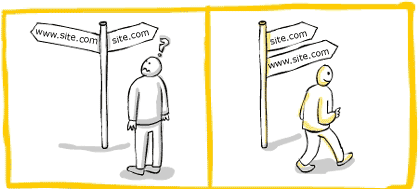An incredibly important aspect of SEO is canonicalisation, but whenever this turn gets brought up in meetings people look completely lost.. and rightfully so. It’s a complicated term to say, let alone understand. But here’s the thing, it’s not all that complicated if you follow some best practises.
Before we dig into this, let’s understand what canonical URLs actually are.

Your canonical URLs tell search engines which page is the correct page. Let us explain, if there are two ways to access the same information on a website, the canonical URL will tell Google which one is the correct one (as the image above shows). The reason this is so important is to avoid duplicate content, which is a big problem on a lot of websites. The most common canonicalisation is that of http://www.yourname.com versus http://yourname.com – If you don’t let the search engine know which one is the correct one, you effectively have 2 duplicate websites and this will result in big optimisation problems.
With eCommerce becoming more and more popular, it is getting harder to compete online. However, if your competitors aren’t handling their canonical URLs correctly, you have the opportunity to capitalise on this. With eCommerce canonicalisation is hugely important because there are normally a number of ways for someone (or a search engine) to find products on your website because of all the categories and search/sort mechanics.
Let’s look at an example.. Here we can see 3 different pages on an retail eCommerce website, but all of the pages will be very much identical:
- http://www.example.com/products?category=dresses&color=red
- http://example.com/dresses/cocktail?gclid=ABCD
- http://www.example.com/dresses/red/reddress.html
In this instance, we have 3 different pages on the website that could all lead to showing exactly the same product/s. We therefore have the potential for a duplicate content situation. To avoid this, we need to choose which page is the most important and then use that to include our link rel=”canonical” tags so that Google is aware of which page to focus on. There are quite a few criteria that go into deciding which page is best, such as: which page ranks already, does one of the pages have important content on it, how many links does each of the pages have and so the list goes on. Unfortunately, as with most things to do with SEO, it’s not just a simple formula to follow. However, what we can tell you is that if you’re setting up a new eCommerce site, then simply placing canonicals in place will save you a lot of trouble down the line and if you currently have a site, logically decide which page would be best for the visitor to your site and tell Google that that page is the most important one.
There are many reasons as to why canonicalisation is important, but these three are worth mentioning:
- Link Consolidation: Instead of having links spread out across multiple pages on a website and diluting page rank, instead have them all pointing to one page so that it may become a powerful page.
- Easy Tracking: If you’re tracking metrics (ie. visitors to your site), it gets complicated if you have multiple pages that are effectively the same thing. Rather have one page and one set of metrics to work with.
- Greater Usability: Just simply, which URL would you prefer a person to see in their browser. We reckon /dresses/red/reddress.html is far more user friendly than /dresses/cocktail?gclid.ACBD
We realise this article does give you the exact steps to implement canonicalisation, but we hope that it assists you with the understanding. You should consult your web developer or SEO to make sure that you’ve implemented the requirements correctly. We’ve seen a lot of websites benefit incredibly from getting this right.
